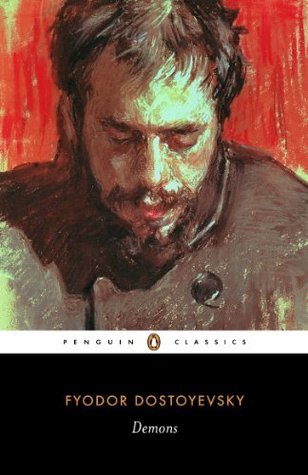More on this book
Community
Kindle Notes & Highlights
he became fearful; he began to take his dreams very seriously.
he went up to the mirror and stood before it for a long time. Finally, he turned away from the mirror towards me and said with a strange sense of despair: ‘Mon cher, je suis un26 man who’s let himself go!’
I do feel bad for the man. I can vaguely guess how this played into his desperation with Pyotr but let's see.
some falling-out indeed had occurred between Liza and Nicolas, but as for the kind of falling-out, Praskovya Ivanovna obviously could form no definite idea.
Poor Stepan Trofimovich was sitting by himself with no premonition of anything. Sad and pensive, he had been glancing out of the window for quite some time to see whether any of his acquaintances was coming. But no one wanted to come near the house. It was drizzling outside and turning cold; the stove should have been lighted; he gave a sigh.
Where are you going? Where are you going? Where are you going!’ ‘I’ll be… right back,’ Stepan Trofimovich shouted from the next room, ‘here I am again!’ ‘Ah, you’ve changed clothes!’ she said derisively as she looked him over. (He had thrown a frock-coat over his dressing jacket.)
Stepan Trofimovich’s estate (about fifty souls according to the old method of reckoning, and adjacent to Skvoreshniki) was not his at all, but had belonged to his first wife, and consequently, was now his son’s.
when Petrusha arrived, he would generously place upon the table the maximum price, that is, as much as fifteen thousand, without the slightest reference to the amounts that had been sent abroad, and would clasp ce cher fils32 firmly, ever so firmly to his breast, whereupon all accounts would be closed once and for all.
They are captivated not by realism, but by the sentimental, idealistic side of socialism, so to speak, its religious tinge, its poetry… secondhand, naturally.
Interesting pov of his philosophy that may be good to remember. Pyotr is probably as much of a dreamer as his father is, and indeed the revolution stared with a bad dream (the poem from 1.1.1 - Part I Chapter I Section I).
He sprayed his handkerchief with scent, but only so slightly, and, as soon as he caught sight of Varvara Petrovna through the window, he hastily picked up another handkerchief, and hid the scented one under a pillow.
We all know he's vain but Varvara Petrovna suppresses that side of him because he's afraid of her. And we know by the next chapter that he is in terrible shame during all this time. Anyway it always comes out later in an outburst of eloquence and French with Stepan.
Can you believe that at that time she had ideas, her own ideas? Now everything has changed! She says that all that is nothing but ancient chatter! She has contempt for what once was… Now she is some sort of steward or housekeeper, an embittered person, and is angry all the time…’
They're two examples of adults who let their own ideas die wthout resolution. They're glamorous underground men. I bet it will turn out later on that Stepan Trofimovich has similarities to Ippolit Terentyev, or if not him, then his son.
He began talking about the town news, about the arrival of the governor’s wife ‘with fresh material for conversation’, about the opposition that had already built at the club, about the fact that everyone was shouting about new ideas and how this had infected everyone, and so on and so forth.
Oh no :). Liputin is kind of a 'spy' (the narrator calls him that) and very cemented in the Verkhovensky rlations - since 1.1.1.
I am convinced that not only is everything known to him about our situation in all its details, but that he knows a great deal more than that, something that neither you nor I know yet, and perhaps will never find out, or will find out when it is already too late, when there is no longer any turning back!’
I suspect so too; I suspect as early on as this Petrusha is already making his rounds around Petersburg and Skvoreshniki and may have ties or influence over Liputin.
Not infrequently it turns out that a writer whom people have long credited with an extraordinary depth of ideas and whom they have expected to exert an extraordinary and major influence on the direction of society, displays in the end such a watered-down and minuscule version of his basic little idea that no one is even sorry that he’s succeeded in writing himself out.
It seems that Dostoyevky is taking about his own class. I'm sure he expected to be one of those writers who will have been forgotten after their deaths, but hey it's over a century years later and we're reading his works
‘can you really suppose that I, Stepan Verkhovensky, am unable to find sufficient moral strength within myself to take up my box — my beggar’s box! —and hoisting it on to my weak shoulders, walk through the gate and disappear from here forever, when that is required by honour and the great principle of independence?


